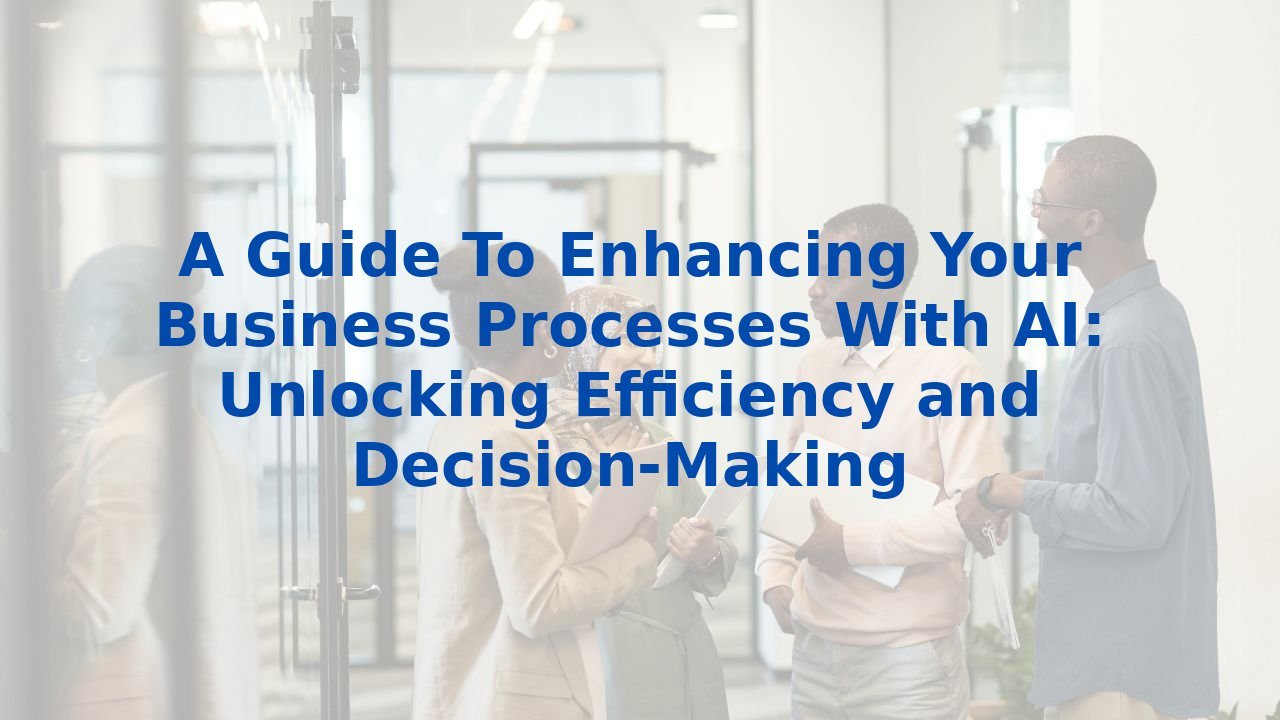A Guide To Enhancing Your Business Processes With AI: Unlocking Efficiency and Decision-Making
A Guide To Enhancing Your Business Processes With AI: Unlocking Efficiency and Decision-Making
In the dynamic landscape of modern business, organizations constantly strive to streamline operations, minimize costs, and augment decision-making capabilities. The advent of artificial intelligence (AI) presents a formidable ally in this pursuit, allowing businesses to optimize various processes and reach new heights of efficiency. This guide will explore the transformative potential of AI across business processes while underscoring the critical role employee training plays in harnessing this powerful technology.
Understanding AI Process Optimization
The heart of AI process optimization lies in leveraging machine learning and analytics to enhance business process management. By systematically analyzing data and automating repetitive tasks, AI not only reduces human error but also empowers team members to make more informed decisions. The ultimate goals include improved productivity, minimized operational risks, and a sharper competitive edge in the market.
Key Applications of AI in Business Processes
1. Process Discovery and Mapping
AI's capacity to utilize process mining and natural language processing can revolutionize how organizations understand their workflows. By accurately uncovering and mapping existing processes, AI ensures that every element is documented and inefficiencies are identified—insights that human analysts might miss.
2. Process Automation
Think of the hours spent on manual tasks such as document processing and data entry. AI bots step in here to effectively handle these monotonous responsibilities, not just reducing errors but also enabling employees to engage in more high-value tasks that promote growth.
3. Real-Time Monitoring and Predictive Analytics
With AI overseeing operations, organizations can receive real-time insights into their processes, pinpointing bottlenecks and potential issues before they become critical. By leveraging historical data for predictive analysis, companies can make proactive choices that drive efficiency.
4. Decision Support and Automation
AI serves as an invaluable decision-making partner, analyzing vast amounts of data to provide actionable insights. Its ability to simulate various scenarios allows companies to consider multiple outcomes, thus enhancing the decision-making framework while also speeding up the process.
5. Customer Service Enhancement
In customer support, AI enhances service quality by managing routine inquiries and analyzing customer feedback. This technology allows organizations to deliver personalized experiences while minimizing wait times—an essential component in today’s service-driven market.
Benefits of AI Integration
1. Improved Efficiency
By automating mundane tasks, AI liberates employees to dedicate their energy to more strategic initiatives, resulting in increased productivity and reduced operational costs.
2. Enhanced Decision-Making
AI empowers businesses with predictive recommendations drawn from intricate data patterns, enabling wiser decision-making and fostering an environment of informed strategy.
3. Risk Identification and Mitigation
By continuously monitoring processes, AI helps detect anomalies and mitigate risks, addressing potential problems earlier and reducing the chances of errors down the line.
4. Customer Satisfaction
AI stands as a beacon of personalized service, allowing organizations to understand and respond to customer needs more adeptly, which in turn fuels higher satisfaction rates.
The Importance of Employee Training
While AI holds incredible promise, its efficacy hinges significantly on workforce competency. Training employees is not merely beneficial; it's essential to unleash AI's full potential.
1. Adoption and Integration
Proper training facilitates the seamless incorporation of AI tools into existing workflows, ensuring that each technological enhancement translates into tangible productivity gains.
2. Data Quality and Accuracy
A well-trained team ensures that the data utilized for training AI models is precise and relevant, which is crucial for the effectiveness of AI-driven initiatives.
3. Continuous Improvement
As technology evolves, so should the skill set of your workforce. Regular training imbues employees with adaptability, fostering an agile culture that thrives in the face of change.
4. Human-AI Collaboration
The magic happens when human insight joins forces with AI capabilities. Adequately trained employees can harness both human intuition and AI-generated insights, enabling a more robust decision-making process.
Conclusion
The potential of AI to reshape business processes—ranging from mapping and automation to real-time monitoring and customer engagement—is immense. With strategic integration, organizations can unlock a realm of efficiency and enhance decision-making. Crucially, this transformation can only be sustained through comprehensive training that empowers employees to thrive alongside AI. By marrying technology and talent, businesses can achieve not just immediate efficiency but long-term success in an increasingly competitive arena. For organizations ready to embark on this journey, understanding the intersections of AI and employee training is the first step toward unlocking unprecedented growth.



